(完整版)英语形容词比较级
英语形容词的比较级和最高级整理

英语形容词的比较级和最高级整理常规:1、一般直接在词尾加er;est.tall---taller---the tallestgreat---greater---the greatest2、以字母e结尾的直接加r;stnice---nicer---the nicestfine---finer---the finest3、以辅音字母加y结尾的形容词变y为i再加er;estbusy---busier---the busiestheavy---heavier---the heaviest4、重读闭音节结尾的单音节词,若词尾只有一个辅音字母时,须双写这个辅音字母再加er;estbig-bigger-the biggesthot -hotter-the hottest5、少数以-y,-er,-ow,-ble结尾的双音节词,末尾加-er^D-est(以-y 结尾的词,如-y前是辅音字母,则变y为i,再加-er和-est;以-e 结尾的词仍只加-r和-st)happy—happier—happiestclever—cleverer—cleverest5、多音节和部分双音节词在词前加more、mosteasily--more easily--most easilybeautiful--more beautiful--the most beautiful特殊:(1 )有些单音节词的比较等级常用more和most,如glad,fond,shy,sly(但like 只可用more 和most)。
Eg:I am not more glad than you.我可没像你那样高兴。
Uncle Jack was more like a book of reference to my father.杰克大叔对我父亲来说真是一部参考书。
(2)有些单音节词用-er和-est或more和most皆可,如free,clear 等。
Eg:I'm clearer/more clear about it than before.对这事,我比以前更清楚了。
形容词的比较级和最高级大全
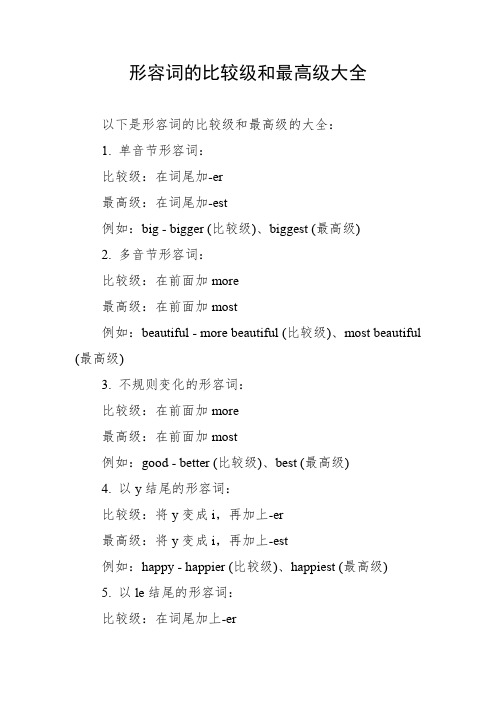
形容词的比较级和最高级大全以下是形容词的比较级和最高级的大全:1. 单音节形容词:比较级:在词尾加-er最高级:在词尾加-est例如:big - bigger (比较级)、biggest (最高级)2. 多音节形容词:比较级:在前面加more最高级:在前面加most例如:beautiful - more beautiful (比较级)、most beautiful (最高级)3. 不规则变化的形容词:比较级:在前面加more最高级:在前面加most例如:good - better (比较级)、best (最高级)4. 以y结尾的形容词:比较级:将y变成i,再加上-er最高级:将y变成i,再加上-est例如:happy - happier (比较级)、happiest (最高级)5. 以le结尾的形容词:比较级:在词尾加上-er最高级:在词尾加上-est例如:possible - more possible (比较级)、most possible (最高级)6. 少数不规则变化的形容词:比较级:在前面加more最高级:在前面加most例如:famous - more famous (比较级)、most famous (最高级)7. 特殊的比较级和最高级:例如:well - better (比较级)、best (最高级)8. 副词的比较级和最高级:比较级:在后面加-er最高级:在后面加-est例如:slowly - more slowly (比较级)、most slowly (最高级)以上是常见的形容词的比较级和最高级,但是也有一些不规则变化的形容词需要记忆。
同时,需要注意的是,有些形容词没有比较级和最高级,如unique。
形容词的比较级大全
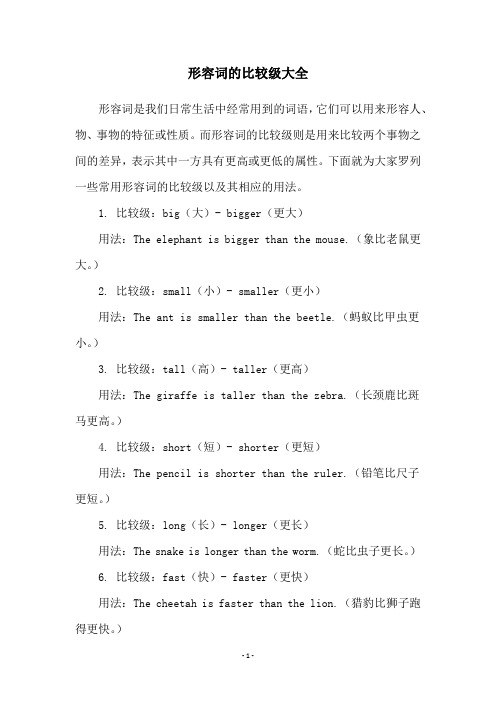
形容词的比较级大全形容词是我们日常生活中经常用到的词语,它们可以用来形容人、物、事物的特征或性质。
而形容词的比较级则是用来比较两个事物之间的差异,表示其中一方具有更高或更低的属性。
下面就为大家罗列一些常用形容词的比较级以及其相应的用法。
1. 比较级:big(大)- bigger(更大)用法:The elephant is bigger than the mouse.(象比老鼠更大。
)2. 比较级:small(小)- smaller(更小)用法:The ant is smaller than the beetle.(蚂蚁比甲虫更小。
)3. 比较级:tall(高)- taller(更高)用法:The giraffe is taller than the zebra.(长颈鹿比斑马更高。
)4. 比较级:short(短)- shorter(更短)用法:The pencil is shorter than the ruler.(铅笔比尺子更短。
)5. 比较级:long(长)- longer(更长)用法:The snake is longer than the worm.(蛇比虫子更长。
) 6. 比较级:fast(快)- faster(更快)用法:The cheetah is faster than the lion.(猎豹比狮子跑得更快。
)7. 比较级:slow(慢)- slower(更慢)用法:The turtle is slower than the rabbit.(乌龟比兔子跑得更慢。
)8. 比较级:easy(容易)- easier(更容易)用法:The multiple-choice test is easier than the essay test.(选择题比论述题更容易。
)9. 比较级:difficult(困难)- more difficult(更困难)用法:Calculus is more difficult than algebra.(微积分比代数更困难。
(完整版)小学英语形容词的比较级
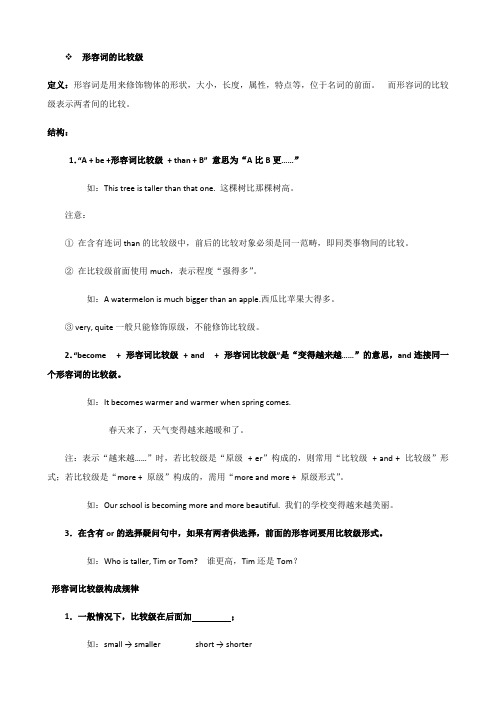
形容词的比较级定义:形容词是用来修饰物体的形状,大小,长度,属性,特点等,位于名词的前面。
而形容词的比较级表示两者间的比较。
结构:1.“A + be +形容词比较级+ than + B” 意思为“A比B更……”如:This tree is taller than that one. 这棵树比那棵树高。
注意:①在含有连词than的比较级中,前后的比较对象必须是同一范畴,即同类事物间的比较。
②在比较级前面使用much,表示程度“强得多”。
如:A watermelon is much bigger than an apple.西瓜比苹果大得多。
③ very, quite一般只能修饰原级,不能修饰比较级。
2.“become + 形容词比较级+ and + 形容词比较级”是“变得越来越……”的意思,and连接同一个形容词的比较级。
如:It becomes warmer and warmer when spring comes.春天来了,天气变得越来越暖和了。
注:表示“越来越……”时,若比较级是“原级+ er”构成的,则常用“比较级+ and + 比较级”形式;若比较级是“more + 原级”构成的,需用“more and more + 原级形式”。
如:Our school is becoming more and more beautiful. 我们的学校变得越来越美丽。
3.在含有or的选择疑问句中,如果有两者供选择,前面的形容词要用比较级形式。
如:Who is taller, Tim or Tom? 谁更高,Tim还是Tom?形容词比较级构成规律1.一般情况下,比较级在后面加;如:small → smaller short → shorter2.在重读闭音节(即:辅音+元音+辅音)中,先双写末尾的辅音字母,比较级加-er,如:big →bigger hot →hotter3.以不发音e结尾的单音节词,比较在原级后加;如:large →larger nice →nicer4.以“辅音字母+y”结尾的双音节词,,比较级加;如:easy →easier heavy →heavier5.多数多音节词,比较级在前面加;如:beautiful → more beautiful different → more different6.有少数形容词的比较级是不规则的,必须熟记。
(完整版)比较级和最高级用法总结
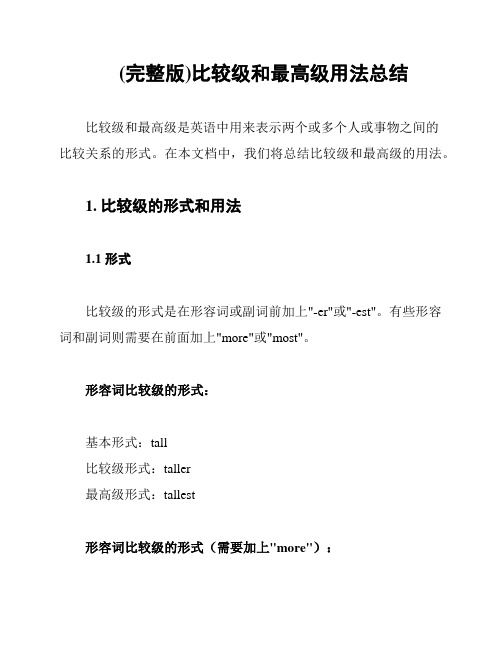
(完整版)比较级和最高级用法总结比较级和最高级是英语中用来表示两个或多个人或事物之间的比较关系的形式。
在本文档中,我们将总结比较级和最高级的用法。
1. 比较级的形式和用法1.1 形式比较级的形式是在形容词或副词前加上"-er"或"-est"。
有些形容词和副词则需要在前面加上"more"或"most"。
形容词比较级的形式:基本形式:tall比较级形式:taller最高级形式:tallest形容词比较级的形式(需要加上"more"):基本形式:beautiful比较级形式:more beautiful最高级形式:most beautiful副词比较级的形式:基本形式:quickly比较级形式:more quickly 或 faster最高级形式:most quickly 或 fastest1.2 用法比较级常用于以下几种情况:- 比较两个人或物体的相对性质或程度。
例如:- He is taller than his brother.- This book is more interesting than that one.- 比较两个人或物体进行选择或决策。
例如:- I prefer coffee to tea.- She is more suitable for the job.- 表示一个人或物体在某一方面比另一个人或物体更具特征。
例如:- The second movie was scarier than the first one.- He is more intelligent than his classmates.2. 最高级的形式和用法2.1 形式最高级的形式是在形容词或副词前加上定冠词"the",并在其后加上"-est"。
有些形容词和副词则需要在前面加上"most"。
(完整版)小学英语比较级

一、形容词、副词的比较级和最高级的构成规则1.大多数单词的变法small→smaller→smallest short→shorter→shortest great→greater→greatest clever→clevere r→cleverest narrow→narrower→narrowest tall→taller→tallest2.以不发音e结尾的单音节词,比较在原级后加-r,最高级在原级后加-st;large→larger→largest nice→nicer→nicest3.先双写末尾的辅音字母,比较级加-er,最高级加-est;big→bigger→biggest hot→hotter→hottest fat→fatter→fattest thin-thinner-thinnest sad-sadder--sa ddest 4.以“辅音字母+y”结尾的双音节词,把y改为i,比较级加-er,最高级加-est;easy→easier→easiest heavy→heavier→heaviest busy→busier→busiesthappy→happier→happiest5.其他双音节词和多音节词,比较级在前面加more,最高级在前面加most;beautiful→more beautiful→most beautifuldifferent→more different→most different注意:(1)形容词最高级前通常必须用定冠词 the,副词最高级前可不用。
6.有少数形容词、副词的比较级和最高级是不规则的,必须熟记。
good-----better------best好的well------better------best身体好的bad------worse------worst坏的ill--------worse-------worst病的many--------more------most许多 much------more--------most许多few------less-------least少数几个little-------less------least少数一点far------further------furthest更进一步,程度far------farther------farthest更远,路程old-------older------oldest年老的(指年纪)old------elder-------eldest年老的(指兄弟姐妹的排行)二、形容词、副词的比较级和最高级的用法1.“A + be +形容词比较级 + than + B”意思为“A比B更……”。
形容词副词比较级最高级变化形式归纳(超全)
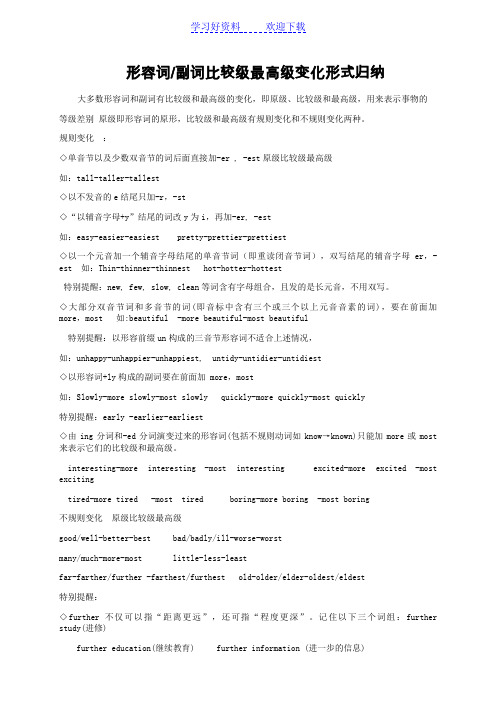
形容词/副词比较级最高级变化形式归纳大多数形容词和副词有比较级和最高级的变化,即原级、比较级和最高级,用来表示事物的等级差别原级即形容词的原形,比较级和最高级有规则变化和不规则变化两种。
规则变化:◇单音节以及少数双音节的词后面直接加-er , -est原级比较级最高级如:tall-taller-tallest◇以不发音的e结尾只加-r,-st◇“以辅音字母+y”结尾的词改y为i,再加-er, -est如:easy-easier-easiest pretty-prettier-prettiest◇以一个元音加一个辅音字母结尾的单音节词(即重读闭音节词),双写结尾的辅音字母er,-est 如:Thin-thinner-thinnest hot-hotter-hottest特别提醒:new, few, slow, clean等词含有字母组合,且发的是长元音,不用双写。
◇大部分双音节词和多音节的词(即音标中含有三个或三个以上元音音素的词),要在前面加more,most 如:beautiful -more beautiful-most beautiful特别提醒:以形容前缀un构成的三音节形容词不适合上述情况,如:unhappy-unhappier-unhappiest, untidy-untidier-untidiest◇以形容词+ly构成的副词要在前面加 more,most如:Slowly-more slowly-most slowly quickly-more quickly-most quickly特别提醒:early -earlier-earliest◇由ing分词和-ed分词演变过来的形容词(包括不规则动词如know→known)只能加more或most 来表示它们的比较级和最高级。
interesting-more interesting -most interesting excited-more excited -most excitingtired-more tired -most tired boring-more boring -most boring不规则变化原级比较级最高级good/well-better-best bad/badly/ill-worse-worstmany/much-more-most little-less-leastfar-farther/further -farthest/furthest old-older/elder-oldest/eldest特别提醒:◇further不仅可以指“距离更远”,还可指“程度更深”。
英语比较级的语法
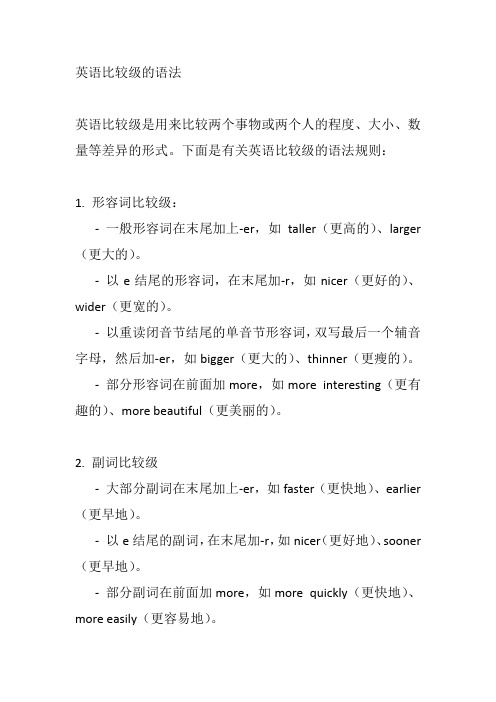
英语比较级的语法英语比较级是用来比较两个事物或两个人的程度、大小、数量等差异的形式。
下面是有关英语比较级的语法规则:1. 形容词比较级:-一般形容词在末尾加上-er,如taller(更高的)、larger (更大的)。
-以e结尾的形容词,在末尾加-r,如nicer(更好的)、wider(更宽的)。
-以重读闭音节结尾的单音节形容词,双写最后一个辅音字母,然后加-er,如bigger(更大的)、thinner(更瘦的)。
-部分形容词在前面加more,如more interesting(更有趣的)、more beautiful(更美丽的)。
2. 副词比较级-大部分副词在末尾加上-er,如faster(更快地)、earlier (更早地)。
-以e结尾的副词,在末尾加-r,如nicer(更好地)、sooner (更早地)。
-部分副词在前面加more,如more quickly(更快地)、more easily(更容易地)。
3. 不规则比较级:-好/好地:better(更好的)/well(更好地)-多:more(更多的)/much(更多地)-少:less(更少的)/little(更少地)-远:farther/further(更远的)4. 比较级的用法:-形容词比较级用于比较两个事物或人的性质、特征,例如"The car is faster than the bike."(这辆车比自行车快)。
-副词比较级用于比较两个动作或状态的程度,例如"She sings more beautifully than her sister."(她唱得比她姐姐更美妙)。
需要注意的是,有些形容词和副词的比较级没有明显的规则,需要通过记忆和学习来掌握。
同时,比较级也可由"than"引导的从句来进行表达,例如"He is taller than I am."(他比我高)。
- 1、下载文档前请自行甄别文档内容的完整性,平台不提供额外的编辑、内容补充、找答案等附加服务。
- 2、"仅部分预览"的文档,不可在线预览部分如存在完整性等问题,可反馈申请退款(可完整预览的文档不适用该条件!)。
- 3、如文档侵犯您的权益,请联系客服反馈,我们会尽快为您处理(人工客服工作时间:9:00-18:30)。
英语形容词比较级英语形容词比较级(一)一般句式的构成:A + is / are+ 形容词比较级+ than + BA 是主格B 是宾格如:She is taller than me.主格形容词比较级宾格(二)英语形容词比较级的构成英语形容词比较等级有三个:原级,比较级和最高级。
形容词比较等级形式变化有规则的和不规则的两种。
规则变化1)单音节词末尾加-er(比较级),-est(最高级)【例】原级比较级最高级great greater greatestsmall smaller smallestclean cleaner cleanest2)单音节如以e结尾,只加-r(比较级),-st(最高级)【例】fine finer finestnice nicer nicestwide wider widest3)闭音节单音节词如末尾只有一个辅音字母,须先双写这个辅音字母,再加-er(比较级),-est(最高级)【例】big bigger biggesthot hotter hottestred redder reddest 4)少数以-y,-er,ow,-ble结尾的双音节词,末尾加-er(比较级),-est(最高级)。
以-y结尾的词,如-y前是辅音字母,则变y为-i,再加-er和-est。
以-e结尾的词只加-r和-st。
【例】clever cleverer cleverestnarrow narrower narrowestable abler ablesteasy easier easiest5)其它双音节和多音节词皆在前面加单词more和most。
【例】careful more careful most carefuldifficult more difficult most difficultdelicious more delicious most delicious不规则变化原级比较级最高级good/well better bestbad worse worstmany/much more mostlittle less leastfar farther/further farthest/furthest注:有些形容词一般没有比较等级。
如:right, wrong, woolen等。
形容词的比较等级的用法:比较级用于二者的比较。
【例】Li Ping is older than Wang Hai. 李平比王海年纪大。
There are more students in Class One than in Class Two.一班比二班学生多。
other后既可接可数名词复数形式又可接不可数名词,如:可数,other pencils 其它的铅笔,other students 其他的学生。
不可数other tea 别的/其它的茶,other information 别的/其它消息。
the other 定指其它的……,其后可接可数名词和单数,如:the other book 另外的一本书,the other map 另一张地图,其后也可跟可数名词的复数形式,如:the other flowers 其他的花朵,the other teachers 其它的老师们,还可以接不可数名词,如:the other water 剩下的水,the other beer 别的啤酒others 其用法相当于复数名词,此词不能用作定语,表示的意思是“不具体的某些东西”,如:This chemical is poisonous . Others are poisonous , too . ( others = other chemicals )但是如果others前用了the ,则表示具体的别的东西。
如:I don’t want these books . Please give me the others .( the others = the other books another,作形容词时,是指在原有的基础上再加一(些),表示“再一(些)”或“另外一个(些)”的意思。
another还可作代词,意思与作形容词时一样。
another作形容词时,是指在原有的基础上再加一(些),表示“再一(些)”或“另外一个(些)”的意思,在心理上至少有三个。
another还可作代词,意思与作形容词时一样。
the other也是既能作形容词,又能作代词。
但它一般用来表示总数为二时的“另外一个”,经常与one搭配。
other也能既作形容词又可作代词,意思是“别的,另外的”。
others只能作代词,意思是“其它的人(物或事等)”,常用来泛指。
the others也只能作代词,意思与others相近,但常用来特指。
another与other的区别。
①Some students like English and other students (others) like physics.有些学生喜欢英语,有些学生喜欢物理。
【解析】other表示“别的”,“另外的”,只能与复数名词连用。
但other前有冠词the即可与单数名词连用。
如:I have two pens. One is blue. The other (pen) is black.我有两枝钢笔。
一支是蓝色的,另一支是黑色的。
②John did better than all the other players in the sport.在那项运动中John比所有别的运动员都出色。
【解析】the other加复数名词指的是一定范围内“所有其余的人或事物”,是特指;而other加复数名词却是没有明确范围的“另外的人或事物”。
如:We must think more of other comrades.我们必须多想想别的同志。
③ This shirt is too large for me. Please show me another.这件衬衫我穿太大。
请另外拿一件我看看。
(一般商店不会只有两件衬衫)【解析】another, the other作代词的用法。
The other表示“两个数量中的另一个”,表示特指,总数为俩;another表示“总数为三个以上中任意的另一个”,表示泛指。
如:His parents both work in a hospital. One is a doctor and the other is a nurse.他父母都在一家医院工作。
一个是医生,一个是护士。
(父母为两个人)其他习惯用法one another, from one…to another, the other day = a few days ago,every otherday/ week/year,some…, others…,如:I met Mr. Smith in the park the other day.前几天我在公园里碰见了Smith先生。
While at the university, he went to the library every other day.在大学时他每隔一天去图书馆一次。
Some people like football, others like volleyball.有些人喜欢足球,有些人喜欢排球。
They are very different from one another.他们互相之间差别很大。
When Americans moved from one place to another, they took their dialects with them.当美国人从一个地方迁移到另一个地方时,other指另外的人或物;other泛指别人,可与some连用;the other 指两个中的另一个,常和one连用;the others 表示其余所有的人或物;another则泛指另一个。
回答者:萧萧羽禺- 魔法学徒一级4-15 15:41 other 可以做形容词,表示其他的,比如other people其他的人。
也可以做代词,但是做代词时一般不以原形出现,一般用以"the other"或者以复数形式“others”出现。
others和some对比使用时, 是“有些”的意思而不是做“其他”讲, 如:Some cleaned the windows, others mopped the floor. 有的擦窗户, 有的擦地板。
the others是“其余的”意思, 表示在一个范围内的其他全部, 如: This dictionary is better than the others. 这本字典比别[其余]的好。
the other是其中的“另一个”, 如:Give me the other one; not this one. 给我那一个, 不是这一个。
两个中的“另一个”是“the other”; 不定数目中的“另一个”是“another” , 如:This glass is broken. Get me another. 这个杯子坏了, 给我另拿一个来。
(在许多杯子中的一个) any other 刚指其他一切的什么、、、another 指另一个,没有固定的范围。
比如:this dress is dirty,please change another one for me.这件裙子脏了,再给我换一件吧。
